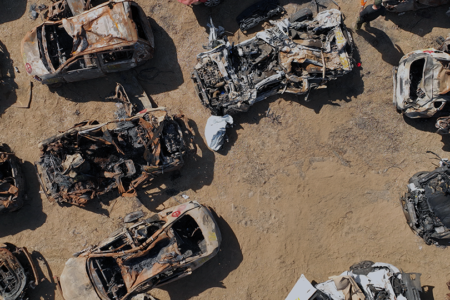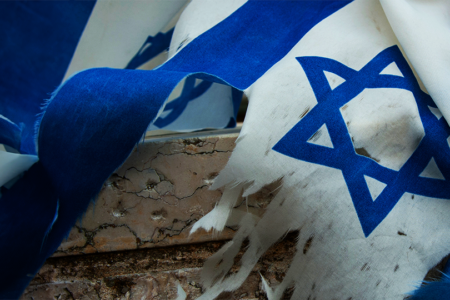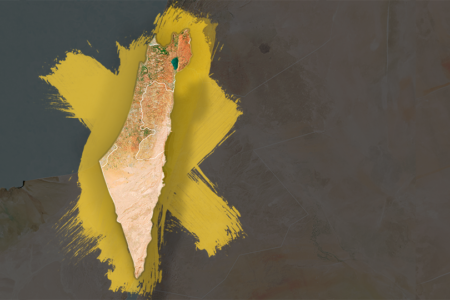Jerusalem Whose City: David’s or Mohammed’s
The corridors of the United Nations have once again resounded with withering oral fusillades against little Israel and Zionism. The latest outrage, calling for a racist label to be affixed to the nation, was accompanied by rapturous demonstrations by the Arabs and their apologists. In concert with the U.N. resolution a straight-faced Anwar Sadat called for the internationalization of Jerusalem. He recognizes, as do all who are even superficially acquainted with the area and issues in question, that Jerusalem is the emotional hub of the entire Middle East confrontation. Mr. Sadat’s proposal will be embraced as both logical and desirable by certain elements throughout the world. Furthermore, we can expect to hear the theme repeated frequently as the possibility of the Arabs retaking the Old City by military force becomes more remote.
Before serious consideration can be afforded this proposal, one starkly fundamental question must be answered: To whom does Jerusalem actually belong? Neither the inundation of this query with bellicose rhetoric nor the tears of pious sentimentality will serve the purpose. Right and justice can only be dispensed when the legitimate claimant is properly identified.
The fact is, while there are two claimants, there is only one case which bears any significant weight – Israel’s. In simple terms, the Arabs make a claim; Israel has a case. Let us examine a few of the elements which are involved.
Divine Right
The one true God, to whom Jews, Arab Muslims and Christians all claim allegiance, has delivered the Land, which, of course, includes Jerusalem to the Jewish people.
And I will give to you and to your descendants after you, the land of your sojournings, all the land of Canaan, for an everlasting possession; and I will be their God. (Genesis 17:8)
The Bible provides further documentation which identifies precisely to whom the covenant given to the patriarch Abraham was to pass upon his death.
But God said, “No, but Sarah your wife shall bear you a son, and you shall call his name Isaac; and I will establish My covenant with him for an everlasting covenant for his descendants after him.” (Genesis 17:19)
These sublime promises were then awarded to Jacob (Genesis 28), and subsequently his heirs, who comprise the twelve tribes of Israel.
The Book of Genesis, which contains these momentous declarations, was written at least two thousand years before Mohammed was born! If one is tempted to write off such documentation as ancient folklore without current relevance, it is well to consider that the Muslims do use their scriptures (the Koran) as justification and inspiration in conducting modern “holy wars” against their enemies. Logically, therefore, if the Hebrews are asked to lay aside their Bible, the Muslims must sheath their swords and stop claiming warfare as the instrument of Allah.
Biblically, it can be emphatically stated that Jerusalem has been divinely given to the Jews in perpetuity.
Prior Occupation
The Jewish people occupied the hallowed ground that is now Jerusalem when David was king over the nation. This was a full sixteen hundred years before the Caliph Omar surveyed the Temple Mount in search of the “Sacred Rock” over which he would build the Mosque of Omar. This structure was the predecessor of the Dome of the Rock which occupies the sight today. From the time David claimed the old Jebusite stronghold the Jews have never willingly relinquished their rights to the city. They were carried from it by the hordes of Nebuchadnezzar into dismal years of captivity. But to that generation of Jews the Euphrates could never be the Jordan, nor the splendor of Babylon a place to be preferred above the environs of sanctified Moriah. In bleak despair they would lift their lament: “By the rivers of Babylon, there we sat down, yea, we wept, when we remembered Zion.”
They were driven away by the Romans following one of the most tenacious contests in the annals of warfare. Their Temple was destroyed and the city sacked and ravaged. But barely had the ashes cooled before they were attempting to return. It is fitting that the enduring monument to this epic rises majestically above the desert hard by the Dead Sea. Atop its plateaued summit Jewish survivors from Jerusalem resisted their antagonists for three grueling years before choosing death by their own hands rather than becoming prey to the Roman legionnaires. Even the name of the place seems to ring with resolution – Masada!
In 135 A.D., after what was perhaps the bloodiest chapter in Jewish and Roman military history, they sold off the hills of their sacred City-Sanctuary. Thus began the trek of the heirs of Abraham across the face of the nations in the historically unprecedented Diaspora. Yet, while the majority of Jews were dispersed, a remnant, at the earliest opportunity, clawed their way back to the only place on earth that could ever really be home to the Jew – Eret Yisrael and Jerusalem.
Samuel Katz, the noted Israeli author, in his book, Battleground, has observed: “The Jews were never without a homeland. Having been robbed of their land, Jews never ceased to give expression to their anguish at their deprivation and to pray for and demand its return.” Mr. James Parkes, in his publication, Whose Land, has documented the fact that except for infrequent brief intervals Jews have always lived in Jerusalem and the land. They remained when bludgeoned and bloodied by a succession of oppressors. They stayed while being vilified and persecuted. The tiny remnant endured through long centuries of mocking rejection by their Gentile neighbors. They tarried until the first waves of returning immigrants began to break over the shores of the Mediterranean as Zion’s sons “came from afar.” They were there at the close of the nineteenth century to extend gnarled hands of welcome to the eager Aliyah (ascenders) as the newcomers scaled the approaches to Jerusalem.
One must conclude that if determination and suffering are to be used as criteria for deciding the ownership of Jerusalem, no more evidence need be presented – the case is closed in favor of the Jews.
But sheer willingness to endure is not the only compelling consideration. Archaeology is delivering devastating blows to Arab aspirations at the Temple Mount, and in the city generally. Dr. Benjamin Mazar and his associates have carefully laid bare the past of the Old City as they have dug through successive layers of history. These archaeological incisions have served to place a dramatic exclamation point over the surviving historical documents of antiquity. So much so that a transparent howl of indignation was raised by the Arabs in the U.N. Their opposition was dignified by UNESCO in a resolution condemning the digs as a threat to the Moslem mosques situated on the Temple Mount. The Arabs are fully aware that, in point of fact, the only threat is to the credibility of their claim to exclusive ownership of the Mount. In reality they seek to quiet the spade, and in so doing spare themselves the recurring embarrassment of new finds. These finds have affirmed concretely the accuracy and trustworthiness of the historical data found in the Bible. An excellent example of this is to be seen in the discovery, on the last day of the 1975 digging season, of Babylonian arrowheads which supplied the first physical evidence of the Babylonian destruction of Jerusalem.
In short, the archaeological discoveries have laid before the courts of world opinion the Jewishness of that sacred area. They are saying to the peoples of the globe, in a way that cannot be rationally challenged: Here is the truth – examine it; hold it in your hands. Who can deny that these finds point like an arrow shaft to Jewish ownership?
Right of Purchase
The Scriptures record the fact that David, Israel’s second monarch, purchased the Temple Mount from Araunah the Jebusite.
However, the king said to Araunah, “No, but I will surely buy it from you for a price, for I will not offer burnt offerings to the Lord my God which cost me nothing.” So David bought the threshing floor and the oxen for fifty shekels of silver. (II Samuel 24:24)
It was on this spot that the first Temple was constructed by David’s son, Solomon.
Then Solomon began to build the house of the Lord in Jerusalem on Mount Moriah, where the Lord had appeared to his father David, at the place that David had prepared, on the threshing floor of Ornan the Jebusite. (II Chronicles 3:1)
Every nation in the world recognizes the basic sanctity of the right of purchase. This place was not bought by an ordinary Israelite; it was purchased by the sovereign head of the nation. It was bought for the nation and was designated as the place upon which the national institution of worship would be constructed. Over all ensuing years Israel has never transferred the deed or placed a “for sale” sign on the property.
Right of Conquest
This proposition will be immediately rejected by many on the grounds that it is not an acceptable moral argument. However, before we repudiate it, let us consider two factors. First, we must recognize that the nations of this world function in a callously pragmatic manner. Strong nations survive; weak nations perish. When strong nations prevail against weaker ones – or stronger organizations within governments revolt and overthrow incumbent groups – the world may experience a period of hand wringing, but it inevitably respects, or at least tolerates, the results. No matter how odious the victors may be initially, in the process of time their claims are certified and they are accepted into the international community of nations. We have witnessed this procedure contemporarily in Russia, China, Cuba and a host of African and Asian countries. There is no appeal to morality by these aggressor nations. Official dogma sanctions subversion, terrorism and murder. They employ military power as aggressors without the slightest degree of moral compunction. It is indeed an incredible phenomenon that the hands raised highest in abhorrence of Israel’s defending its basic right to survival are those which bear vivid stains from the blood of innocent people they themselves have suppressed.
Now let us turn to the specific case of Israel and Jerusalem. Under the Partition Plan adopted by the United Nations in 1947, which was to be implemented at the expiration of the British Mandate on May 15, 1948, Jerusalem was to become an international city under U.N. trusteeship. The proposals of the Partition Plan were accepted by the Jews but rejected by the Arabs. At the expiration of the Mandate the Arabs initiated an attack which was designed, in their words, to “drive Israel into the sea.” Israelis call this period their War of Independence. It might better be designated as her struggle for survival. As hostilities began the Arab Legion promptly occupied the Old City and launched a devastating assault on the residents in the Jewish Quarter. After a period of grim resistance Jews were forced to capitulate and were consequently expelled from the city. They would be sealed off from their homes and houses of worship for the next nineteen years. During this period the Jewish Quarter was desecrated and synagogues systematically destroyed. Headstones from the graves of Jews were used as paving stones and building material. Most consequential, from a spiritual standpoint, was their being deprived of access to the Wailing Wall. Over these nineteen years the Jordanians held Old Jerusalem by conquest. It was held in open defiance of the U.N. Partition Plan. It is of great significance that during this period the U.N. made no serious, sustained efforts to persuade Jordan to relinquish control or to allow Jews access to their homes and places of worship. Equally interesting is the fact that there were no cries of outrage heard from among the nations condemning the aggression and continued intransigence of Jordan.
Note: Aranah and Ornan are names for the same man. See I Chronicles 21:18-30.
When fighting erupted in 1967, Jewish military forces were committed to a defensive posture in West Jerusalem. They did not want a war with Jordan and did everything in their power to circumvent its occurring. It is a matter of historical record that on the morning of Monday, June 5, Israeli Prime Minister Levi Eshkol sent a message to King Hussein by way of General Odd Bull, the U.N. commander: “We shall not initiate any action whatsoever against Jordan. However, should Jordan open hostilities, we shall react with all our might and he (King Hussein) will have to bear full responsibility for all the consequences.” General Bull confirmed delivery of this message to Hussein. Later that same morning Jordanian forces began an artillery attack all along the Jewish border. In an interview held in Jerusalem some weeks ago, I asked General Uzi Narkiss, who was Israeli Central Commander in charge of operations in Jerusalem, his reaction to the Jordanian attack. He replied, “I couldn’t believe it. I didn’t believe that he (Hussein) would do anything. Every hypothesis was against the possibility of attack. Hussein is ordinarily a sober and lucid man. However, at this time he had become intoxicated by Nasser’s claims of sweeping victory in the Sinai and pressed by his own forces to enter the war.” He commented further that “The great miracle of the Six Day War was not the victory which reunified Jerusalem. The miracle was that he (Hussein) attacked.” The rest is history.
In evaluating the Jewish conquest of Jerusalem, at least three things should be weighed. (1) Their triumph was not the result of an act of aggression; it was rather the result of a response to aggression. (2) Jews did not confiscate territory to which they had no claim. As we have seen, their claim is valid. (3) Occupying Jerusalem restored possession of legally owned Jewish properties and assured access to sanctuaries which are unquestionably Jewish historically. In view of these and other pertinent facts, we can well understand why the Israelis have declared Jerusalem to be among the few non-negotiable sectors in the territories gained in the Six Day War.
Competent Proprietorship
A fundamental consideration involved in territorial possession is what the proprietors do once they have the land. How are the inhabitants treated? What becomes of the land and its resources? In other words, is the nation in control competent to administer affairs in the areas held?
Here we are not left to doubt. None of the conquerors of Jerusalem, ancient or modern, have demonstrated competence more thoroughly than have the Israelis. In this respect, one does well to remember that Israel has a unique relationship to the city and its surroundings. To the ancient empires it was a place to conquer. They sacked it or embellished it for the glory of the conqueror or his sovereign. To the Crusaders it was part of a quixotic era which was designed to expel the infidel and establish a Christian kingdom complete with moated replicas of medieval European fortresses. It was a period in the history of Christianity which hardly exemplified the true mission of the Church of Jesus Christ in this world. To the Arab Moslem it has ever been a place which held the distinction of being ranked third religiously, behind Mecca and Medina. It has only been in more recent years, as the place became increasingly strategic politically, that the Arabs have become emotionally spastic at the possibility of Jerusalem being controlled by someone else. To the Jew it represents his spiritual and terrestrial home. To him it is the eternal city – city of his ancient fathers; city of generations yet unborn; city of his coming Messiah.
Over the long years of her history Jerusalem has been exploited, taxed, reigned over, mutilated and camped upon – only Israel has embraced her. Everywhere one goes around the City of David he will see evidences of this eternal love affair. A few short years ago, had a blind man stumbled outside the city walls, he might have cursed the stones. Today, increasingly, he would have cause to bless the flowers! The barren neglect which has been in evidence since the Romans methodically denuded the approaches to the walls is beginning to disappear. It is giving way to shrubbery, trees, grass and flowers. It is clear that two thousand years of pent up desire is now being unleashed as the Jewish people lavish their love on that which virtually represents their heart and soul.
These are not sentimental meanderings. It is difficult to interpret for the Western mind the depth of love the Jews have for Jerusalem. We have no equal standard for comparison. But if one has the opportunity to walk among them down Ben Yehuda Street in the early evening, sit in the cafes, listen to young Sabras and elderly immigrants engage in animated conversation and watch the eyes of old soldiers as they talk about the day the paratroopers first kissed the Western Wall, then he will begin to appreciate, in some small measure, what this place means to the Jews. After all the years of wandering, searching, suffering and raising the passionate prayer, “Maybe next year Jerusalem”, it is paradise regained.
Practically, there are many problems – Jews are first to admit this. But in consulting with those in government, education and social services it is at once clear that great efforts are being made to produce lasting solutions. This is not true for Jewish residents only; it is also true for the Arab segments of the community. There is a deep concern among Jewish leadership to find a solution to the Arab refugee problem.
Religiously, Arabs are free to live in their homes and worship at the mosques of the Old City. Christians, likewise, can freely exercise themselves in worship at their churches. Pilgrims of all faiths mingle in the streets. Israel is committed to the concept of religious freedom for all its people.
When all is said and done, there is no logical reason to wish to deny the Jews of, what is to them, the heart of their heritage. This is a day when all men should rejoice to stand reverently by while the sons and daughters of Abraham caress their beloved Jerusalem.







